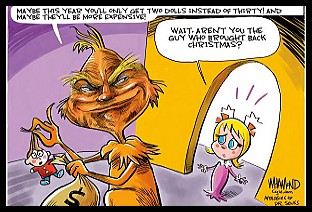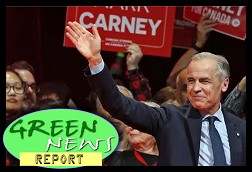By Brad Friedman from St. Louis, MO...
Enough. Enough. Enough already with this nightmare. It's time to decertify, ban, burn, crush, destroy all Direct Recording Electronic (DRE) touch-screen voting machines. Period.
DREs should never be allowed for use in another American election. Period.
Here's the lede from today's latest head-spinner, courtesy of Declan McCullagh at C|NET News...
...
Ohio law permits anyone to walk into a county election office and obtain two crucial documents: a list of voters in the order they voted, and a time-stamped list of the actual votes. "We simply take the two pieces of paper together, merge them, and then we have which voter voted and in which way," said James Moyer, a longtime privacy activist and poll worker who lives in Columbus, Ohio.
...
Moyer and fellow activist Jim Cropcho tested this by dropping by the election office of Delaware County, about 20 miles north of Columbus, and reviewing the results for a May 2006 vote to extend a property tax to fund mental retardation services (PDF). Their results indicate who voted "yes" and who voted "no"--and show that local couples (the Bennets, for instance) didn't always see eye-to-eye on the tax.
ES&S machines are used in 38 states, and, of course, the ES&S spokesperson quoted in the article blames Ohio's procedures for allowing such records to be viewed by the public in the first place. Remember, the voting machine companies hate transparency and don't believe citizens should have the right to see anything concerning their own democracy.
They will also try to distract from the fact that the greatest threat to election integrity and security comes from election insiders --- such as voting machine company employees and elections officials --- rather than the public at large.
The well-reported and sourced C|NET article explains that the other major voting machine companies, Sequoia and Diebold, both deny that the same thing --- matching voters to votes --- is possible with their machines. An unnamed Diebold spokesperson, as usual, goes so far as to lie about the matter to the reporter, claiming they don't include time-stamps on the records for security and privacy reason. He/she added, "We're very sensitive to the integrity of the process."
That Diebold spokesperson is, of course, lying.
Last week, The BRAD BLOG detailed fraudulent claims on Diebold's website which said that on their touch-screen systems "the order of cast ballots is scrambled to further insure ballot anonymity." That claim runs counter to the findings of University of California's recent "Top-to-Bottom Review" of all certified voting systems in the state. The UC findings [PDF] on Diebold's voting system source code, as commissioned by California Secretary of State Debra Bowen, revealed precisely the opposite to be the truth...
The UC study detailed a "Failure to protect ballot secrecy" in Diebold's touchscreen AccuVote TSx voting machine. They report that "Both the electronic and paper records of the Diebold AV-TSX contain enough information to compromise the secrecy of the ballot. The AV-TSX records votes in the order in which they are cast, and it records the time that each vote is cast. As a result, it is possible for election workers who have access to the electronic or paper records and who have observed the order in which individuals have cast their ballots to discover how those individuals voted."
The fraudulent claims posted on the Diebold Election Systems, Inc., website have not be reposted since they took down the original site, and re-opened late last week as a newly renamed company. Their "new" company is called Premier Elections Solutions, and their false claim about the secrecy of ballots on the company's touch-screen voting systems has been left off of the new site.
In today's C|NET article, UC computer science professor David Wagner re-iterates the same concerns about privacy issues on the ballots of Diebold/Premier's DRE voting systems:
"This summer I learned that Diebold's AV-TSX touchscreen voting machine stores a time stamp showing the time which each vote was cast--down to the millisecond--along with the electronic record of that vote," Wagner said in an e-mail message. "In particular, we discovered this as part of the California top-to-bottom review and reported it in our public report on the Diebold voting system. However, I had no idea that this kind of information was available to the public as a public record."
While the voting machine companies blame Ohio for giving access to such public records to mere mortals (e.g., citizens who vote and have a right to such information), changing the public records laws in Ohio and other states in order to disallow citizen access to such things wouldn't take care of the problem either.
"Computer scientists and security experts say restricting the public's access to e-voting paper trails by tinkering with open records laws is insufficient," C|NET explains wisely, "it doesn't protect against, for instance, an insider perusing the ballots and reconstructing them."
As we've tried to explain many times here, it's the unfettered access to these systems and records by election insiders --- such as elections officials and voting machine company employees --- that we must be primarily concerned about. Not the acccess of the general voting public.
That much is true, no matter how much the election insiders --- such as elections officials and voting machine company employees who have such unfettered access --- try to tell you, and the media, otherwise.


 Prosecutors Resign After Trump U.S. Attny Strikes Deal With Felon Cop: 'BradCast' 5/5/25
Prosecutors Resign After Trump U.S. Attny Strikes Deal With Felon Cop: 'BradCast' 5/5/25 Sunday 'Good Buy, Dolly!' Toons
Sunday 'Good Buy, Dolly!' Toons Trump Losing Streak Continues into SECOND Hundred Days: 'BradCast' 5/1/25
Trump Losing Streak Continues into SECOND Hundred Days: 'BradCast' 5/1/25 'Green News Report' 5/1/25
'Green News Report' 5/1/25
 100 Daze: 'BradCast' 4/30/25
100 Daze: 'BradCast' 4/30/25 Campaign to 'Impeach Trump Again' Gains Fresh Momentum: 'BradCast' 4/29/25
Campaign to 'Impeach Trump Again' Gains Fresh Momentum: 'BradCast' 4/29/25 'Green News Report' 4/29/25
'Green News Report' 4/29/25 And Then They Came for the Judges...: 'BradCast' 4/28/25
And Then They Came for the Judges...: 'BradCast' 4/28/25 Sunday 'Desperation' Toons
Sunday 'Desperation' Toons Trump EPA Guts Enviro Justice Office: 'BradCast' 4/24/25
Trump EPA Guts Enviro Justice Office: 'BradCast' 4/24/25 'Green News Report' 4/24/25
'Green News Report' 4/24/25 Sunday
Sunday  Largest U.S. Broad-caster Hoaxes Viewers to Help Gut FCC Rules: 'BradCast' 4/23/25
Largest U.S. Broad-caster Hoaxes Viewers to Help Gut FCC Rules: 'BradCast' 4/23/25 FCC on Precipice of Ending All Limits on Corp. Control of Local TV Stations
FCC on Precipice of Ending All Limits on Corp. Control of Local TV Stations GOP Earth Day 2025 Hypocrisies and Dilemmas: 'BradCast' 4/22/25
GOP Earth Day 2025 Hypocrisies and Dilemmas: 'BradCast' 4/22/25 Pope Francis Dies, Trump Still Alive and Criming: 'BradCast' 4/21/25
Pope Francis Dies, Trump Still Alive and Criming: 'BradCast' 4/21/25 Soc. Sec. Expert Warns DOGE of Collapse, Privatization: 'BradCast' 4/10/2025
Soc. Sec. Expert Warns DOGE of Collapse, Privatization: 'BradCast' 4/10/2025 Trump Blinks, Chaos Reigns, Markets Spike Amid Tariff 'Pause': 'BradCast' 4/9/25
Trump Blinks, Chaos Reigns, Markets Spike Amid Tariff 'Pause': 'BradCast' 4/9/25 SCOTUS Deportation Ruling Grimmer Than First Appears: 'BradCast' 4/8/25
SCOTUS Deportation Ruling Grimmer Than First Appears: 'BradCast' 4/8/25 Cliff Diving with Donald: 'BradCast' 4/7/25
Cliff Diving with Donald: 'BradCast' 4/7/25
 VA GOP VOTER REG FRAUDSTER OFF HOOK
VA GOP VOTER REG FRAUDSTER OFF HOOK Criminal GOP Voter Registration Fraud Probe Expanding in VA
Criminal GOP Voter Registration Fraud Probe Expanding in VA DOJ PROBE SOUGHT AFTER VA ARREST
DOJ PROBE SOUGHT AFTER VA ARREST Arrest in VA: GOP Voter Reg Scandal Widens
Arrest in VA: GOP Voter Reg Scandal Widens ALL TOGETHER: ROVE, SPROUL, KOCHS, RNC
ALL TOGETHER: ROVE, SPROUL, KOCHS, RNC LATimes: RNC's 'Fired' Sproul Working for Repubs in 'as Many as 30 States'
LATimes: RNC's 'Fired' Sproul Working for Repubs in 'as Many as 30 States' 'Fired' Sproul Group 'Cloned', Still Working for Republicans in At Least 10 States
'Fired' Sproul Group 'Cloned', Still Working for Republicans in At Least 10 States FINALLY: FOX ON GOP REG FRAUD SCANDAL
FINALLY: FOX ON GOP REG FRAUD SCANDAL COLORADO FOLLOWS FLORIDA WITH GOP CRIMINAL INVESTIGATION
COLORADO FOLLOWS FLORIDA WITH GOP CRIMINAL INVESTIGATION CRIMINAL PROBE LAUNCHED INTO GOP VOTER REGISTRATION FRAUD SCANDAL IN FL
CRIMINAL PROBE LAUNCHED INTO GOP VOTER REGISTRATION FRAUD SCANDAL IN FL Brad Breaks PA Photo ID & GOP Registration Fraud Scandal News on Hartmann TV
Brad Breaks PA Photo ID & GOP Registration Fraud Scandal News on Hartmann TV  CAUGHT ON TAPE: COORDINATED NATIONWIDE GOP VOTER REG SCAM
CAUGHT ON TAPE: COORDINATED NATIONWIDE GOP VOTER REG SCAM CRIMINAL ELECTION FRAUD COMPLAINT FILED AGAINST GOP 'FRAUD' FIRM
CRIMINAL ELECTION FRAUD COMPLAINT FILED AGAINST GOP 'FRAUD' FIRM RICK SCOTT GETS ROLLED IN GOP REGISTRATION FRAUD SCANDAL
RICK SCOTT GETS ROLLED IN GOP REGISTRATION FRAUD SCANDAL VIDEO: Brad Breaks GOP Reg Fraud Scandal on Hartmann TV
VIDEO: Brad Breaks GOP Reg Fraud Scandal on Hartmann TV RNC FIRES NATIONAL VOTER REGISTRATION FIRM FOR FRAUD
RNC FIRES NATIONAL VOTER REGISTRATION FIRM FOR FRAUD EXCLUSIVE: Intvw w/ FL Official Who First Discovered GOP Reg Fraud
EXCLUSIVE: Intvw w/ FL Official Who First Discovered GOP Reg Fraud GOP REGISTRATION FRAUD FOUND IN FL
GOP REGISTRATION FRAUD FOUND IN FL

































